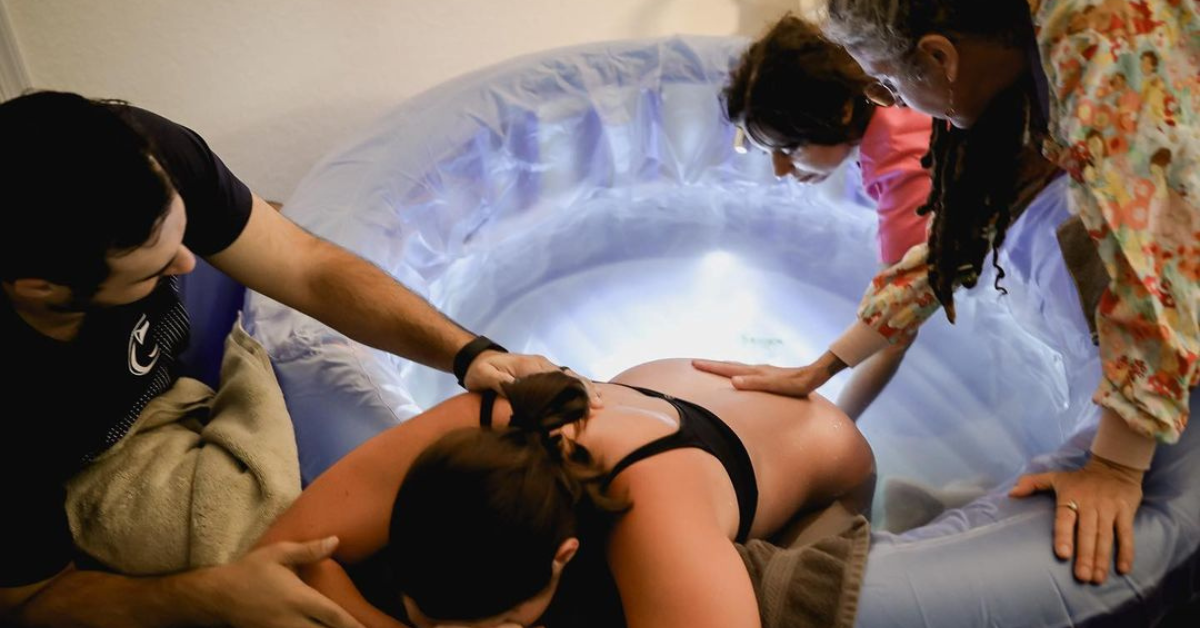When thinking about having a baby, pregnant women have different healthcare options to think about. One of these options is to have a midwife support them during a home birth, which combines professional care with the comfort of being at home. Midwifery is an ancient profession that focuses on helping women through the natural stages of pregnancy, labor, and delivery without unnecessary medical procedures. Midwives are trained experts who provide personalized care, education, and support throughout pregnancy.
Choosing the right healthcare provider is crucial to ensure safety and a positive birthing experience. Home births with midwives are designed to meet each woman’s specific needs and preferences while still following strict health and safety guidelines. A midwife’s knowledge of normal childbirth can create a calm atmosphere where women feel empowered and at ease.
It’s important to note that home births with midwives are most suitable for low-risk pregnancies. They offer a private setting for mothers to give birth in a place they know well and feel comfortable in. This choice demonstrates a belief in the natural process of childbirth, with minimal interference but careful professional supervision.
Benefits of Choosing a Midwife for Your Home Birth
Choosing a midwife for your home birth can offer a plethora of benefits, especially when it comes to maternal and infant health outcomes. Among these advantages are the lower rates of maternal morbidity and intervention that often accompany midwifery-led care.
1. Lower Rates of Maternal Morbidity and Intervention
Regarding home births attended by licensed or certified nurse midwives, studies have consistently shown lower rates of obstetric interventions compared to hospital births. These interventions can include cesarean sections and episiotomies, which are more commonly performed in a hospital setting.
One significant advantage of having a midwife-led home birth is the potential decrease in medical interventions like cesarean sections. While C-sections can be life-saving procedures in certain circumstances, they also carry risks such as infection, blood clots, and complications in future pregnancies. Midwives are trained to support natural childbirth and only refer women for C-sections when medically necessary, contributing to lower rates of this intervention.
Episiotomies, another common obstetric intervention, are also less likely to occur in midwife-attended home births. This surgical cut made at the opening of the vagina during childbirth can lead to complications such as pain during sex, bowel and bladder problems, and potential future surgeries.
Midwife-led care during home births is particularly suitable for low-risk pregnancies. With personalized care plans tailored to each woman’s unique needs and circumstances, midwives can help ensure a safe and healthy delivery without unnecessary medical interventions.
Note: It’s essential to clarify that avoiding interventions does not mean avoiding necessary medical care. Midwives are skilled healthcare professionals who can recognize when medical attention is required and refer their clients for further care if needed.
One of the key benefits of home birth with a midwife is the holistic approach that prioritizes natural birthing processes. This approach can improve health outcomes by reducing unnecessary interventions and decreasing the risk of related complications.
While the potential for lower rates of maternal morbidity and intervention is a significant benefit, it’s only one aspect of why many women choose midwife-led home births. The next sections will explore other advantages, such as enhanced bonding and support, breastfeeding success, and empowering birthing processes with personalized care.
2. Enhanced Bonding, Support, and Breastfeeding Success
When a family chooses a midwife-assisted home birth, they are immersed in an environment that fosters immediate bonding between the mother and newborn. Licensed and certified nurse midwives prioritize creating a calm and intimate setting for birth, which can significantly influence the early interactions between mother and child.
Here are some ways in which midwife-led home births promote bonding, support, and breastfeeding success:
Immediate Skin-to-Skin Contact: Unlike in many hospital settings where obstetric interventions may delay such contact, home births often enable the baby to be placed directly on the mother’s chest. This skin-to-skin contact stabilizes the baby’s temperature, heart rate, and breathing while also calming the mother.
Supportive Environment: Midwives provide continuous support throughout labor, birth, and the postpartum period. They are trained in neonatal resuscitation and infant CPR, ensuring that both mother and baby have professional care readily available.
Breastfeeding Initiation: A midwife’s guidance is invaluable when initiating breastfeeding. In the comfort of home, without the pressure of hospital protocols, mothers may find it easier to start breastfeeding under the watchful eye of their midwife.
Postpartum Well-being: The benefits of home birth extend into the postpartum period. With a supportive midwife by their side, new mothers receive personalized care that can lead to increased confidence in parenting and improved overall well-being.
The advantages pregnant women experience with midwife-led home births are significant. For those without high-risk pregnancies seeking a birth experience with minimal medical intervention, this option offers a nurturing pathway to parenthood.
3. Empowering the Birthing Process with Personalized Care
Choosing a midwife for home birth can be an empowering experience because of the personalized care you’ll receive. Licensed and certified nurse midwives prioritize your individual needs and respect your decisions throughout labor and delivery. This customized approach is one of the main advantages of home birth.
Supportive Environment for Labor
During a home birth, the atmosphere is naturally supportive, allowing you to find your ways of coping with labor pain. Unlike traditional hospital settings where medical interventions are more routine, a midwife-assisted home birth often involves fewer interventions and more opportunities for natural pain management methods. With guidance from your midwife, you might explore techniques such as:
- Movement
- Hydrotherapy
- Massage
- Breathing exercises
These approaches can help ease discomfort without relying on medication.

Expertise in Labor Pain Management
If you’re worried about managing labor pain without medical interventions like epidurals during a home birth, it’s important to know that midwives are trained in various techniques to support you. They have extensive knowledge about non-drug pain relief methods that can be highly effective.
Suitability for Low-Risk Pregnancies
It’s crucial to recognize that midwife-led home birth is most suitable for those with low-risk pregnancies. Midwives undergo training to identify potential risks and will recommend a hospital birth if they anticipate any complications that could endanger the mother or baby.
By choosing this option, expectant mothers can look forward to an empowering birthing process where they receive guidance in making informed choices about their bodies and how their babies will be born.
Things to Consider Before Choosing a Midwife-Led Home Birth
When thinking about having a midwife-led home birth, it’s important to make an informed decision and carefully assess the risks involved. This means understanding home versus hospital births’ possible difficulties and safety issues.
One important question is whether emergency medical services are readily available. Even with good planning, unexpected problems can happen during childbirth. Having immediate access to professional medical assistance in these situations is crucial. Before deciding on a home birth, you should consider how close you are to a well-equipped hospital that provides obstetric care.
Here are some key points to keep in mind:
- Evaluate your overall health and how your pregnancy is going. Midwife-led home births are usually only recommended for pregnancies with low risk factors.
- Look into the emergency services and hospitals in your area. Make sure there’s a backup plan if you need urgent medical help.
- Talk to your chosen midwife about possible situations and safety measures. It’s important to feel comfortable with the plan they have in place.
In short, while a midwife-led home birth can have many advantages, gathering all the necessary information and thinking carefully about every aspect of the decision, especially regarding safety concerns, is crucial.
Finding the Right Midwife for Your Home Birth
Selecting a qualified and experienced midwife attending home births is crucial for ensuring a safe and supported birthing experience. Here are some tips to guide you in your search:
1. Start with Referrals
Ask friends, family, or your healthcare provider for recommendations of trusted midwives known for quality home birth care.
2. Local Midwifery Associations
Contact state or local midwifery organizations which can provide lists of certified practitioners in your area.
3. Online Directories
Utilize online resources such as the “Midwives Alliance of North America” (MANA) directory or “The American College of Nurse-Midwives” (ACNM) to find a home birth midwife near you.
4. Interview Potential Midwives
Once you have a list, arrange interviews to discuss their philosophy, experience, and procedures. This will help you gauge your comfort level with them.
5. Check Credentials
Ensure that the midwife is licensed and certified to practice in your state. Certifications from recognized bodies like ACNM or the North American Registry of Midwives (NARM) are indicators of professional competency.
6. Read Reviews and Testimonials
Look for reviews from other families and their experiences. Hearing firsthand accounts can be enlightening.
7. Discuss Availability and Backup Plans
Your chosen midwife should be available around your due date and have a clear backup plan if they cannot attend your birth.
By taking these steps, parents-to-be can feel confident in their choice of midwife and excited about the journey ahead.
The Flexibility and Affordability of Home Births with Midwives
When planning your birth, it’s important to think about the cost and flexibility of having a home birth with a midwife. Here are some things to consider:
- Cost: Home births are often much cheaper than hospital births. This is especially true if you don’t have health insurance or if your insurance has a high deductible.
- Insurance: Some insurance companies cover home births, saving you money. Check with your provider to see what they offer for midwife-led home births. Also, check to see if your chosen midwife accepts insurance. Some only take cash-pay options.
- Personalized Care: Midwives provide individualized care focusing on the mother’s needs. This can improve the overall birthing experience. Many women who choose home births with midwives are happier with their experience than those who give birth in hospitals.
The Benefits of Giving Birth at Home
Home births have some unique advantages that make them appealing to many expectant mothers:
- Comfortable Environment: Being in your home during labor can help you feel more relaxed. This can lead to a smoother delivery process.
- Freedom of Movement: With a midwife by your side, you can move around as you please during labor. You can find positions that are most comfortable for you and change them whenever needed.
- Choice of Support: During a home birth, you have full control over who is in the room. You get to decide who shares this special moment, whether it’s just your partner or a few close family members.
- Continuity of Care: Midwives provide prenatal and postnatal care besides delivering your baby. This means they’ll be there for you throughout your pregnancy journey, offering support and guidance at every step.
Considering these factors can help you determine if a home birth with a midwife is the right choice for you. Choosing to have a midwife-assisted home birth is a big decision that affects many aspects of a woman’s healthcare journey.





